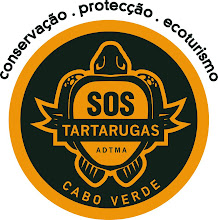 |
| Plastic litters the beaches on Sal |
SOS Tartarugas joins the war on plastic bags! We are proud to have formed a partnership with the Capeverdean NGO, ADAD (read more about ADAD here) who have started a project, funded in part by PRCM, to reduce the amount of plastic bags used in Cape Verde. Plastic bags are a blight on our landscape here on these beautiful islands, hundreds of them can be seen in the road, on trees, stuck against fences and worst of all, floating around in the sea.
Unfortunately there is very little awareness of the problem amongst the population as well as shop owners and plastic bags are given away for every single small purchase.
 |
| A musician watches the proceedings |
 |
| Ana Claudia & Ana Sofia give away SOS bags as prizes |
SOS participated in ADAD's activities to celebrated Environmental Day with music, prizes and a display of traditionally made bags produced by artisans on different islands. The materials used included rice sacks, paper & cotton. Read about the launch of this project here.
 |
| Artisans show traditionally made bags |

Television report of the event.
Here on Sal these great cotton bags will be produced by RA-AMAO (Associação das Mulheres da África Ocidental)
a women's association and SOS have already ordered the first 100. We will be selling the bags for no-profit to residents and for a small profit to tourists so that we can fund the next production run. It is fantastic to be able to support an enterprise based on Sal.






No comments:
Post a Comment